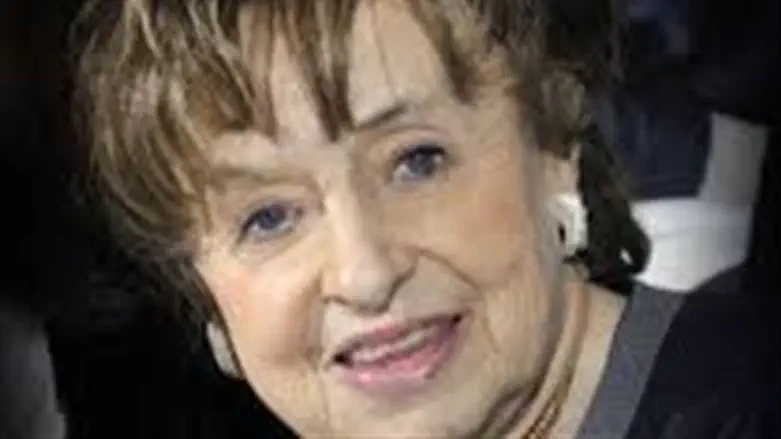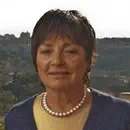
The name of the late Lady Amélie Jacobovits (1928-2010) appears on the list of the wives of peers in the United Kingdom, as she received the title when Queen Elizabeth elevated her late husband, Chief Rabbi Lord Immanuel Jacobovits, to the life peerage in 1988. But on the "list" of great Jewish women, a more exclusive and certainly more significant list yet to be written, her name is featured most prominently.
In honor and memory of this beloved Woman of Valor, whom everyone called Lady J, an evening was held this week at the Begin Center in Jerusalem, in the presence of family members and the many English olim and others who knew her, at which Legacy Live Productions showed their newly-produced film of her life and launched the creatively designed book "Lady J - How One Woman Gave the Most out of Life and How You Can too."
Legacy Live, headed by Rabbi Naftali Schiff, is the multimedia division of Jroots, a non-profit organization specializing in Holocaust education, Jewish heritage tours and passing on the values of past generations. Rabbi Schiff, who spoke at the event chaired by John Corre, believes that the impact of films about individuals who can serve as models for Jewish values can be transformative – and the film and unusually put together book are two examples of this mission (they can be obtained through the website).
This writer was lucky enough to have known Lady J and was her guest on more than one occasion, so watching the film and hearing her cultivated, warm-but-sensible voice, and seeing that ubiquitous happy twinkle in her eye – some called her Lady Joy - evoked fond memories of a special, woman about whom it was said that when "she saw a need in the world, she didn't think about it. She just went ahead and she did it," to quote one of her daughters.
The book and film, however, showing her through the eyes of those who knew her best, are geared to the younger generation who did not know her at all and can be inspired by her story. And the most important message to be gleaned from Lady J's life is her remark that "all I want to do is leave some sunshine behind me" – this she did and her legacy is to teach the next generation of young people to continue to do the same.
Organized and energetic, fun-loving, modest but always well put-together, she did not waste a moment, finding time, despite all her official duties, to set an example to her daughters by davening with great feeling every day, to bake challot which she distributed to the ill and lonely, to visit those in need, to respond to all the letters she received, even those from schoolchildren. All of us know tha things need to be done, but Lady J did them – without delay.
Virtually everyone at the shiva, said her friends, recounted a time when Lady J wrote – she made a habit of dropping short note to people who might benefit from her caring about their joys, troubles or bereavement - called, or visited them and made the world a happier place for them. It was all for the sake of G-d, all the sake of Torah.
This was not such a simple achievement. Lady J, eldest daughter of the famed Torah scholar Rabbi Elie Munk, zts"l, was a Holocaust survivor whose family was barely saved through the miraculous intervention of a non-Jew at a critical moment. Somehow, this did not affect her love of life, which she said she had inherited from her mother.
The family lived in Paris after the war, and when a young and promising English rabbi came to visit, her wise father suggested that she show him around the city. That was all it took for the two to become an inseparable couple and devoted to one another for the fifty years of their marriage, in which Rabbi Jacobovits was Chief Rabbi of Ireland, rabbi of the prestigious Fifth Avenue Synagogue in New York (where I first met them), and then Chief Rabbi of Great Britain and the Commonwealth.
Good deeds, openness and personal caring, setting an example of faith and integrity characterized Lady J's understanding of a Rebbetzin's position. Everyone felt they were her best friend – and perhaps they were, judging by her son's story of how, as his guest after the Chief Rabbi's passing, she stayed in her room on Erev Pesach so as not to be in the way, but the phone bill showed close to 600 calls from her thick book of telephone numbers!
And when the leader of England's Reform Jewry (actually what Americans call Conservative, while Liberal is English Reform Jewry) passed away, Lady J was waiting at the door to comfort this wife when she came from the funeral. She went regularly to visit Lady Margaret Thatcher in her later years.
Lady J had clear feelings about how one can make a marriage and family relationships work. She had a list of the ten commandments of a successful marriage on her fridge - "what's really important in life." After her husband's death of a sudden stroke, she spoke at a commencement where an honorary degree was bestowed on her, and said the words that reached to everyone's heart: "I once asked my husband 'what would your father have thought of me?' and he said: 'He would have loved you , because you do not walk in front of me nor behind me, you walk beside me.' And I still do."
When Lady J died, her children opened the Ark in her retirement bungalow to remove the Sefer Torah inside. Next to it they found the four siddurim she had used in her lifetime, each one inscribed with a daughter's name and a personal message to her.
This was her way of continuing her love and life's message to the next generations of her beloved family. The film and book make that message open to everyone, along with the desire to live the motto coined by her admirers: "Do a Lady J – do it today!"

